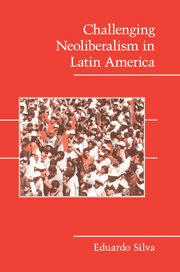Book contents
- Frontmatter
- Contents
- List of Tables
- Preface and Acknowledgments
- List of Acronyms
- 1 THE INCONVENIENT FACT OF ANTI-NEOLIBERAL MASS MOBILIZATION
- 2 CONTENTIOUS POLITICS, CONTEMPORARY MARKET SOCIETY, AND POWER
- 3 THE ARGUMENT: EXPLAINING EPISODES OF ANTI-NEOLIBERAL CONTENTION IN LATIN AMERICA
- 4 ARGENTINA
- 5 BOLIVIA
- 6 ECUADOR
- 7 VENEZUELA
- 8 PERU AND CHILE
- 9 CONCLUSION
- References
- Index
4 - ARGENTINA
Published online by Cambridge University Press: 05 June 2012
- Frontmatter
- Contents
- List of Tables
- Preface and Acknowledgments
- List of Acronyms
- 1 THE INCONVENIENT FACT OF ANTI-NEOLIBERAL MASS MOBILIZATION
- 2 CONTENTIOUS POLITICS, CONTEMPORARY MARKET SOCIETY, AND POWER
- 3 THE ARGUMENT: EXPLAINING EPISODES OF ANTI-NEOLIBERAL CONTENTION IN LATIN AMERICA
- 4 ARGENTINA
- 5 BOLIVIA
- 6 ECUADOR
- 7 VENEZUELA
- 8 PERU AND CHILE
- 9 CONCLUSION
- References
- Index
Summary
Mass mobilization rocked Argentina in December 2001, shattering its image as a model transition to free markets and democratic consolidation. All across the land, demonstrators stood at roadblocks spoiling to confront riot police; they staged massive banner-filled marches on government centers, banged pots and pans, and made decisions in impromptu popular assemblies. Everyone participated, working people, poor people, unemployed people, pensioners, aged retirees, young lower-class toughs, respectable middle-class people, and the entire seething mass chanting “que se vayan todos,” out with the whole rotten political class! The outpouring of rage caused a political crisis that, among other events, forced the president of the nation, Fernando de la Rúa, to resign. And yet, for all its drama, December 2001 was but the crest of sustained anti-neoliberal protest that from humble beginnings in 1990 expanded over three distinct waves.
Building Contemporary Market Society, 1989–95
The accumulation of frustration, anger, and despair at the economic and political exclusion caused by radical free-market reforms of the 1990s must be understood against the backdrop of Argentina's national-populist order. Economic nationalism, planning, and socialization had left a legacy of state enterprises, particularly in energy, telecommunications, transportation, utilities, and infrastructure. The state promoted public education and supported a public pay-as-you-go pension system that in 1980 covered close to 70 percent of the economically active population, one of the most comprehensive in the region (Murillo 2001). High levels of state employment were a corollary of the state's economic activity, bolstering middle classes but also skilled labor.
- Type
- Chapter
- Information
- Challenging Neoliberalism in Latin America , pp. 56 - 102Publisher: Cambridge University PressPrint publication year: 2009



